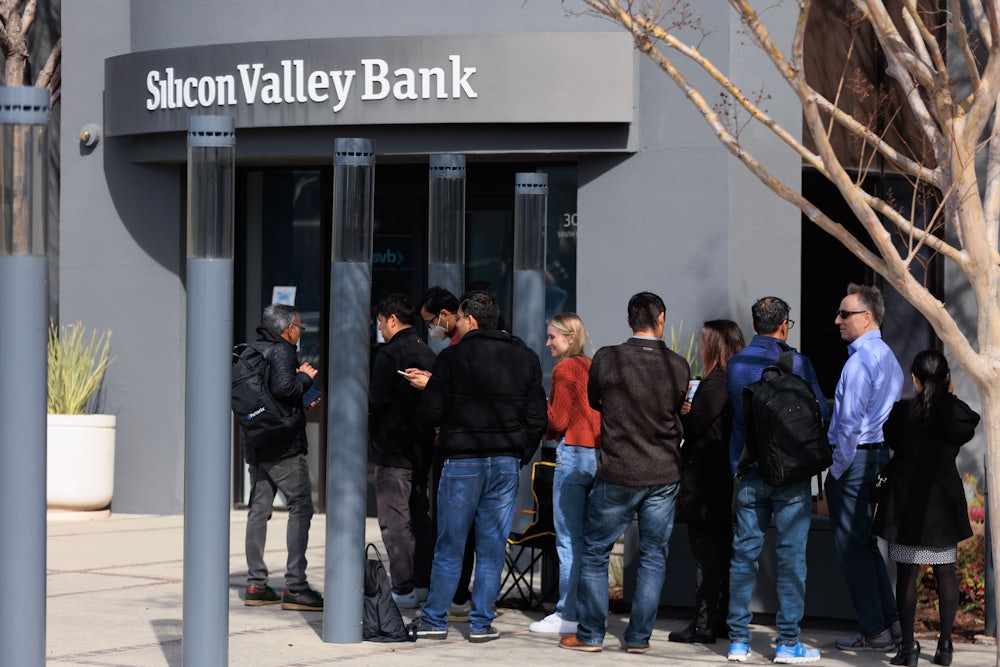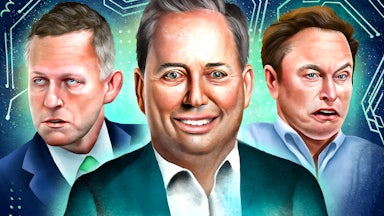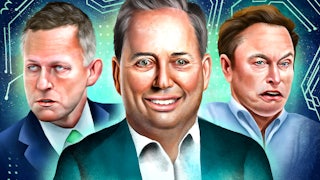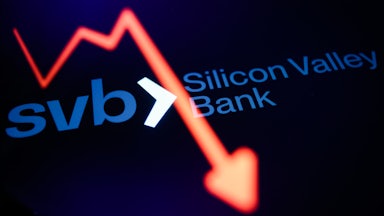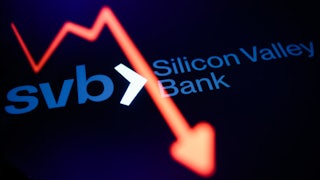The Treasury, the Federal Reserve, and the Federal Deposit Insurance Corporation announced on Sunday that they will guarantee all deposits that were still held at the ill-fated Silicon Valley Bank when it collapsed last Friday. This is probably a good thing. SVB was the sixteenth-largest bank in the United States, with tens of billions in holdings still trapped behind its crumbling walls. Vaporizing that much money might have had dire implications for other parts of the American financial system—and for thousands of innocent customers who believed their money to be safe within SVB’s coffers.
The actions these government entities have undertaken on the bank’s behalf also seemed like a no-brainer to many Silicon Valley figures, who spent their weekends arguing and tweeting passionately for it to happen. One of them was David Sacks, a PayPal co-founder and prominent venture capitalist in the Bay Area. “Where is Powell? Where is Yellen?” he asked. “Stop this crisis NOW. Announce that all depositors will be safe. Place SVB with a Top 4 bank. Do this before Monday open or there will be contagion and the crisis will spread.”
But Sacks quickly found, via social media, that not everybody was so enthusiastic about a bailout for some of the richest people in the country. The Biden administration had to take pains to explain that no taxpayer dollars would be spent to guarantee SVB’s deposits and that the money would instead come from the FDIC’s insurance fund. While true in a technical sense, that fund is replenished by fees from banks all over the country, which in turn come from the fees that Americans pay to their banks all the time. In an indirect way, we all just bailed out Silicon Valley this weekend.
“The only reason people are being stubborn about this point is because Silicon Valley Bank has the name Silicon Valley in it,” Sacks noted in a Unherd interview on Sunday night. “If this was a farmers’ bank and it was 40,000 farms, small business farms that were on the hook, everybody would understand. The arguments being made would be: we can’t let 40,000 farms go out of business. They didn’t do anything wrong. They just trusted when they put their money in a bank that it was safe.”
That observation is undoubtedly true. It is also an important realization by someone who dwells in the gilded bubble of Sand Hill Road. Most people have an affinity for farmers because they provide a valuable service in our lives. Many people also have increasingly negative views of Silicon Valley and Big Tech in general after living with the consequences of its decisions over the last decade or so. The tech V.C. community should take it for what it is: a warning to change course.
It does not help matters that SVB’s downfall appears to be somewhat self-inflicted. The FDIC effectively took it over on Friday morning before the markets could open. In the preceding days, reports of its precariousness had prompted many key Silicon Valley figures, such as Peter Thiel and other high-profile venture capitalists, to withdraw their money from the bank and quietly urge others to do the same.
A bank run inevitably followed as word spread. On Thursday, the day before the FDIC intervened, a whopping $42 billion had been withdrawn from SVB out of just under $180 billion in deposits. By Friday, SVB had become the second-largest bank failure in American history, exceeded only by the collapse of Washington Mutual in 2008. A broader contagion effect appears to have been avoided for now in the American financial sector, meaning that most Americans won’t notice what happened unless they checked their retirement portfolios for a few hours on Monday morning.
Why was a bailout so urgent in this case? When a bank goes under, each depositor is guaranteed to recover at least $250,000 in deposits from the FDIC’s insurance fund. That quarter-million-dollar limit is usually fine since most Americans do not keep $250,000 in the bank on a day-to-day basis. Wealthier Americans find other ways around it: Milwaukee Bucks star Giannis Antetokounmpo famously keeps up to $250,000 in at least 50 different banks just in case.
But the Silicon Valley V.C. class thought a little too hard outside the box this time. Working with SVB, which had a nearly half-century history in the region, was seen as a mark of pride and success. Start-up founders were encouraged to rely on the bank for all sorts of financial services, from their company’s payrolls to their own mortgages. That lack of diversification meant that the bank’s failure had an outsize impact on Silicon Valley and the broader tech ecosystem. Sacks and other venture capitalists understandably flocked to Twitter to raise the alarm.
Here is where I must note that I don’t want to paint with too broad a brush here. There are plenty of tech companies that sell products that improve people’s lives or are good cost for value. Apple didn’t sell 232 million iPhones last year because people don’t like them or don’t get anything out of them. Laptops are lighter and faster than ever. Hard drives store more data than ever. There are a host of potentially promising clean-energy start-ups that could one day be key players in the fight against climate change.
But there are also tech companies that have enriched themselves at the cost of making other people’s lives considerably worse. Start-up founders often talk about “disrupting” an existing industry through some sort of technological innovation or new computer-based system. Uber and Lyft burned through billions upon billions in venture capital over the last decade while they wiped out taxi-cab companies in major cities around the world. Supplanting them are transitory “gig economy” jobs that lack the stability or income of what they replaced.
Airbnb, which once served as a way to temporarily rent out an extra room or a pied-à-terre, has now grown so large that it’s warping the housing market in some parts of the country. Would-be “real estate entrepreneurs” are gobbling up housing and rental stock in some markets so they can float it as short-term rentals on the popular service for “passive income.” There has been some backlash to this, both in the form of local regulations and customers who are tired of paying exorbitant cleaning fees, but the company shows no real sign of slowing down.
I could go on and on. There is widespread skepticism (at best) of companies from both the political left and the political right for, respectively, facilitating and censoring extremist content on their services. People are not generally thrilled that their personal information is being bought and sold like other commodities. Cryptocurrencies did not begin as a Silicon Valley gewgaw but quickly became one of its industry’s obsessions. They made a few people tremendously wealthy at the cost of a great many marks, rubes, and bag holders.
It is also hard not to be a little resentful of Silicon Valley’s immense wealth if you live in the shadow of it. California’s housing crisis is now legendary for its scope and scale. But it has also spread outside the Golden State’s borders to drive up property prices and rent well beyond what neighboring states’ residents can often afford. Families and longtime residents have been priced out of their communities in Arizona, Idaho, Nevada, and elsewhere in the Mountain West. The first and most believable villain on the popular TV show Yellowstone was a California real estate developer.
And then there is Silicon Valley’s culture—hyperlibertarian, hypercapitalist, and hyper-self-confident. Government regulations are something to be avoided or ignored. Unions are verboten. Those who create companies are referred to as “founders” with an added touch of reverence, like America’s Founding Fathers or the villains from Star Trek: Deep Space Nine. When they create a new company, it is described as “building” in the same tone that one might use for a cathedral. Silicon Valley is deeply in love with itself, which partly explains why the mundane task of parking your cash at a bank turned into a status symbol at SVB.
It does not help that the golden boy of the Bay Area over the last year or so has been Elon Musk. Over the past year, the Tesla and SpaceX CEO has purchased Twitter, summarily fired most of its workforce, and then driven it into the ground. Since it is no longer a public company, Musk is not required to publicly disclose its financial health. But we can draw some reasonable inferences from the fact that he is trying to rapidly monetize nearly every aspect of the user experience and, perhaps more ominously, has skipped paying rent and Amazon Web Services hosting fees at various times in recent months.
Silicon Valley’s leadership caste has not looked askance at his scorched-earth approach to Twitter’s workers, his weird musings on “wokeness,” or even his public firing-mocking of a disabled Twitter employee last week. (Musk, perhaps after finally answering his lawyers’ calls, reversed course on the last one.) Other “founders” have found it inspiring and sought to emulate it. In sum: This is not a culture that respects either its workers or its neighbors, and they should not be surprised when workers and neighbors don’t respect it in turn.
Sacks only apparently realized the scope of hostility toward a bailout of Silicon Valley over the weekend. “We’ve reached a point of political division where it’s fine to root for members of another tribe losing their bank deposits—even though you would protect members of your own tribe in the same situation,” he wrote on Twitter. “Be careful what you wish for because the shoe may soon be on the other foot.” But “political division” is not actually correct here. There was actually a remarkable consensus on opposing a taxpayer-funded bailout from both the right, which inexplicably blamed the collapse on “wokeness,” and the left, which is unsympathetic to wealthy Silicon Valley investors as a matter of course.
“Be careful what you wish for” is still a good takeaway from this saga, though. Silicon Valley’s V.C. class should use this rare opportunity to reflect on whether what they’re “founding” and “building” is actually improving the world around them, as they so often claim, or whether they are merely improving their own bottom line at the expense of others. Are they backing and supporting rent-seeking middlemen? Or are they developing tangible products that actually help the average person’s life? We know which side of that line farmers live on. Where the tech venture capitalists of the world want to be is up to them. Things might not go so smoothly next time.
